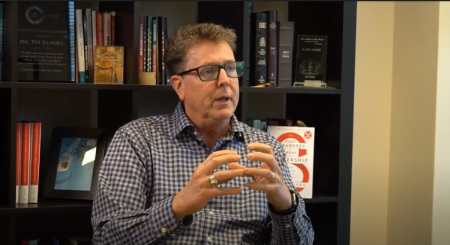Leadership expert Tim Elmore shares tips for leading well in disruptive times

Tim Elmore, the founder and CEO of Growing Leaders, an expert on developing leadership skills for people in all walks of life, says the skill sets that are needed most right now to thrive are those that fall under social and emotional intelligence, warning that people today are "feeling more than they’re thinking."
Elmore, who worked alongside famous leadership coach John C. Maxwell for 20 years and has helped corporate executives, educators, professional athletes and ministry leaders for decades, told The Christian Post in a recent interview that COVID-19 was the “great accelerator.” For many, including pastors, that means the pandemic has shone a light on areas where advancement is needed, especially when it comes to technology.
It was during the lockdowns that Elmore says it became clear to him that “the only way leaders are going to be able to navigate successfully — not just survive but thrive — would be to develop some social and emotional skills that, before today, we didn’t need as much.”
“I think that these skill sets that would fall under social intelligence and emotional intelligence are the need of the hour right now,” he added.
To help pastors and others lead well in today’s ever-changing culture, Elmore wrote his latest book, Eight Paradoxes of Great Leadership(HarperCollins Leadership). He shares stories of how God uses ordinary people and gives them the vision to fulfill His mission.
Like most books, Elmore said he had 800 ideas, but only eight made the cut. They encompass skill sets that apply to men and women of all races and ethnic backgrounds. He shares a case study for each point.
While the book was completed during the lockdowns, Elmore told CP the seed was planted years ago while in a green room with 16 other leaders when he had an opportunity to do his own focus group. He asked whether they believed it was harder to lead today than decades ago when they first began.
“It shocked me. Every person said absolutely harder today,” said Elmore, who explained that the resounding answer in the affirmative led him on a quest to find out why it’s harder. In part, it’s because life went from “complicated to complex,” he added.
He lamented that today’s culture is an “either-or world” where people are expected to be on one side or the other.
“Even though we are a very educated population in North America, there are signals that we’re not utilizing our smarts,” he continued. “People are feeling more than they’re thinking, so they’re dying on hills they don’t need to die on.”
Soon after the COVID-19 pandemic began, Elmore said he witnessed something “unacceptable” — the mass resignation in which CEOs, pastors and leaders left their positions.
Numerous employees resigned from Fortune 500 companies in 2020. And in 2021, over 11.5 million people left their jobs, Elmore said. He wants his book to help all who are now tasked with leading in uncertain times.
One person who exemplifies the eight paradoxes in the book is Jesus, Elmore exclaimed.
“I look at the Gospels, and then I see Jesus as the leader. He’s a Savior. He’s a healer. He’s Lord. He is confident as He sets his face, like flint toward Jerusalem. And yet, He says, 'I’m meek and humble.' I get teary just thinking about this Savior, who He knows what’s ahead of Him because He knows He’s going to the cross.”
When asked by this reporter if pastors and ministry leaders can still make disciples in today’s culture and do it well, Elmore declared that there’s no reason why they can’t. They need to follow Jesus’ example of how to do it.
“More time with less people equals greater impact,” he said. “We are into crowds and income. ... That’s the American Church — nickels and noses, count them, count them, count them. And we do need that, but I think disciple-making is different than crowd-drawing."
“Jesus had the masses; He had the 70, and He had the 12, and He had the three," he stressed. "He made disciples of those last two rings. More time with 12 equals greater Kingdom impact. We need to make more time for interpersonal relationships."
“Look what they [Jesus’ disciples] did in two generations,” he said. “They turned the world upside down.”






















